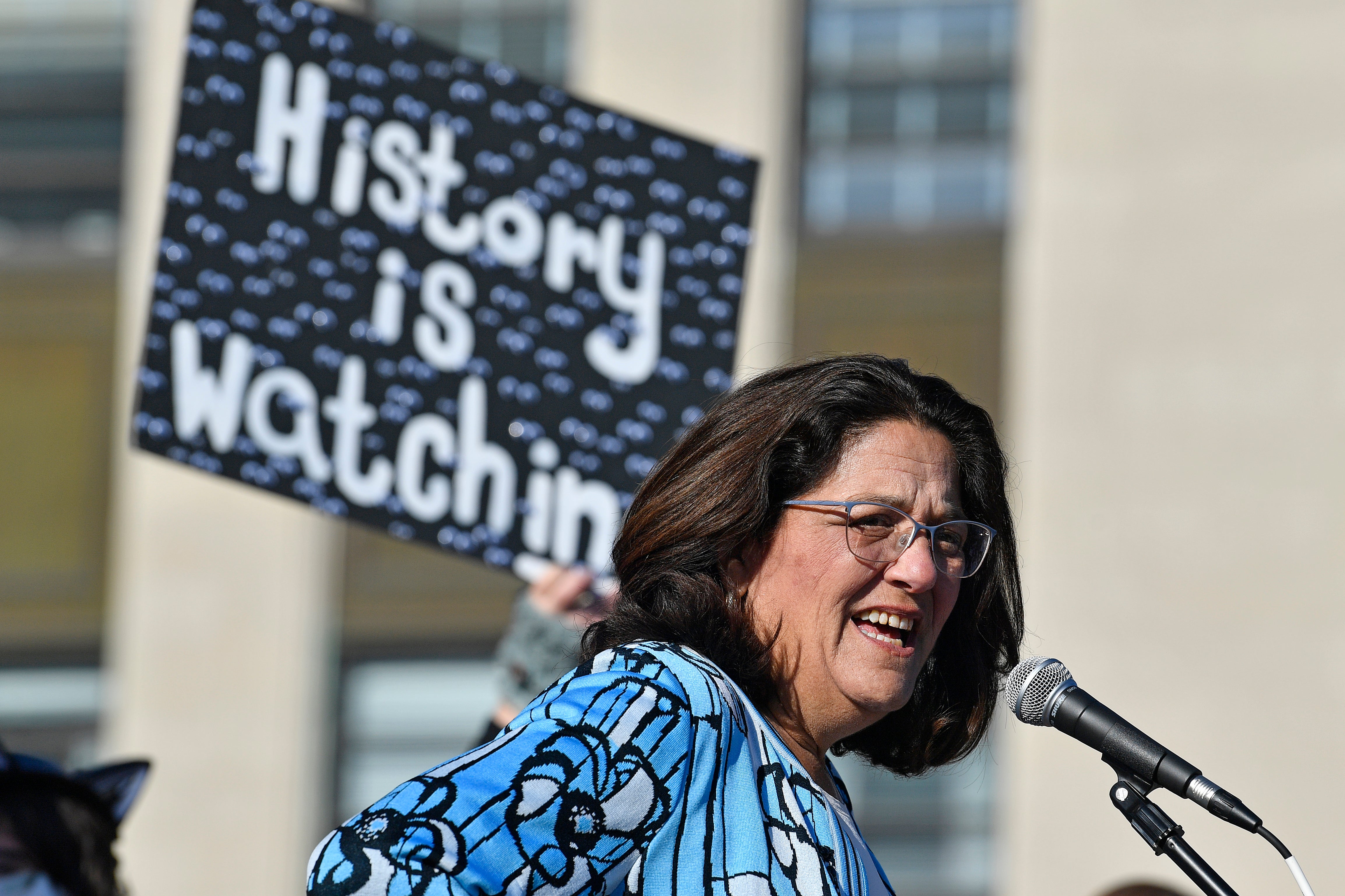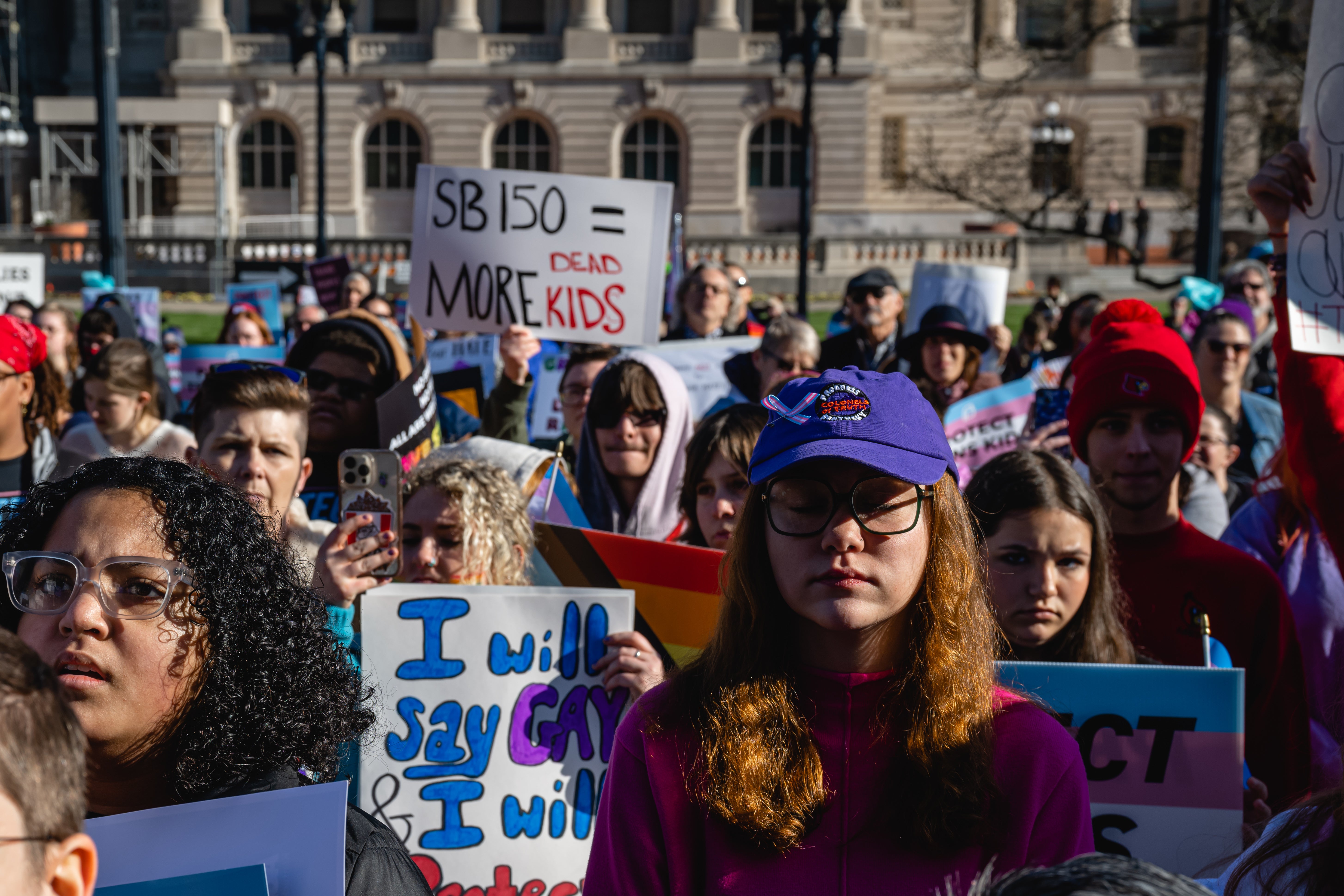Kentucky Republicans strike down governor’s veto of sweeping anti-trans law
A state lawmaker whose trans son died by suicide last year pleaded with Republicans to reject the law, derided by LGBT+ advocates as a ‘desperate and cruel effort by extremist politicians’
Your support helps us to tell the story
From reproductive rights to climate change to Big Tech, The Independent is on the ground when the story is developing. Whether it's investigating the financials of Elon Musk's pro-Trump PAC or producing our latest documentary, 'The A Word', which shines a light on the American women fighting for reproductive rights, we know how important it is to parse out the facts from the messaging.
At such a critical moment in US history, we need reporters on the ground. Your donation allows us to keep sending journalists to speak to both sides of the story.
The Independent is trusted by Americans across the entire political spectrum. And unlike many other quality news outlets, we choose not to lock Americans out of our reporting and analysis with paywalls. We believe quality journalism should be available to everyone, paid for by those who can afford it.
Your support makes all the difference.Republican lawmakers in Kentucky have overridden the governor’s veto of sweeping legislation to ban gender-affirming care for transgender youth, restrict which bathrooms and locker rooms students can use, and prohibit students from using pronouns and names other than those assigned at birth.
The legislation, denounced by LGBT+ advocates as one of the most extreme and dangerous state-level bills targeting trans people amid an explosion of similar proposals, was struck down by Democratic Governor Andy Beshear last week.
But the state’s GOP-dominated state legislature, with veto-proof Republican supermajorities that can obstruct the governor’s actions, voted to override the governor’s veto on 29 March.
“Trans children exist and trans children deserve to be allowed to exist. Today, Kentucky’s legislators have chosen to promote hate and disinformation instead of standing up to it,” Democratic Kentucky state Senator Karen Berg said in a statement shared with The Independent.
Ms Berg is the mother of Henry Berg-Brousseau, a transgender employee of the Human Rights Campaign who died by suicide last year. The organisation is among LGBT+ advocacy groups leading legal and legislative campaigns against a historic wave of state-level bills targeting LGBT+ Americans.
“This hate building across the country weighed on him,” Ms Berg said in a statement announcing his death in December.
During legislative debate over Senate Bill 150, she denounced the “absolute willful, intentional hate for a small group of people who are the weakest and the most vulnerable among us.”
“You need to come back to these people and you need to ask them: Why did you get elected? What are you doing here? What was your purpose in choosing to serve? Because if it was to help the least among us, you are failing miserably,” she said.

Kentucky’s omnibus law targeting trans youth effectively outlaws gender-affirming care, rejects requirements in schools to refer to children by their preferred pronouns, and prohibits discussion of sexual orientation and gender identity in schools, adopting elements of what critics have called “Don’t Say Gay” language introduced in similar bills across the US.
Lessons at any grade level about gender identity or sexual orientation will be prohibited, and schools will be required to notify parents and caregivers before introducing any programmes that discuss sexuality.
The Human Rights Campaign has warned that the legislation would force teachers to disclose confidential conversations they have had with their students about their sexual orientation or gender identity to the student’s parents, even if that would put the student in danger at home.
“Kentucky’s legislators show no shame,” Cathryn Oakley, the state legislative director and senior counsel for the Human Rights Campaign, said in a statement shared with The Independent.
The bill is “nothing but a desperate and cruel effort by extremist politicians in Kentucky to stigmatize, marginalize and erase the LGBTQ+ community, particularly transgender youth,” she added.
The ACLU of Kentucky suggested that the organization will challenge the legislation in court.
“Trans Kentuckians, medical and mental health professionals, and accredited professional associations pleaded with lawmakers to listen to the experts, not harmful rhetoric based in fear and hate. Their pleas fell on deaf ears as the general assembly passed the bill in a matter of hours,” ACLU Kentucky’s executive director Amber Duke said in a statement shared with The Independent.

LGBT+ advocacy groups have identified more than 470 bills this year considered harmful to LGBT+ Americans. At least 190 of those measures would specifically target trans people.
There are nearly 2 million people living in the US who identify as transgender, representing fewer than 1 per cent of all Americans. Yet states are increasingly engaged in legislation and policies to restrict or eliminate access to gender-affirming medical care and other support systems.
At east 10 states have enacted laws or policies banning gender-affirming care for young trans people, and more than a dozen others are considering similar measures.
Anti-trans legislation and rhetoric have also consumed right-wing media, this year’s Conservative Political Action Conference, or CPAC, and, increasingly, in Congress, where lawmakers in Washington DC are mulling national bills that mirror the proposals dominating state capitols.
More than half of all trans youth in the US between the ages of 13 and 17 are at risk of losing access to age-appropriate and medically necessary gender-affirming healthcare in their home state, according to the Human Rights Campaign.
The onslaught of legislation and volatile political debate surrounding the bills has also negatively impacted the mental health of an overwhelming majority of young trans and nonbinary people, according to recent polling from The Trevor Project and Morning Consult.
A separate survey from The Trevor Project found that 45 per cent of trans and nonbinary youth have seriously considered attempting suicide over the last year.
The results of a wide-ranging survey from The Washington Post and KFF found that a vast majority of trans Americans are satisfied with their lives after transitioning.
If you are experiencing feelings of distress, or are struggling to cope, you can speak to the Samaritans, in confidence, on 116 123 (UK and ROI), email jo@samaritans.org, or visit the Samaritans website to find details of your nearest branch.
If you are based in the USA, and you or someone you know needs mental health assistance right now, call or text the 988 Suicide and Crisis Lifeline by dialing 988. This is a free, confidential crisis hotline that is available to everyone 24 hours a day, seven days a week.
If you are in another country, you can go to www.befrienders.org to find a helpline near you.
If you are based in the US and seek LGBT+ affirming mental health support, resources are available from Trans Lifeline (877-565-8860) and the LGBT Hotline (888-843-4564), as well as The Trevor Project (866-488-7386 or text START to 678-678).






Join our commenting forum
Join thought-provoking conversations, follow other Independent readers and see their replies
Comments